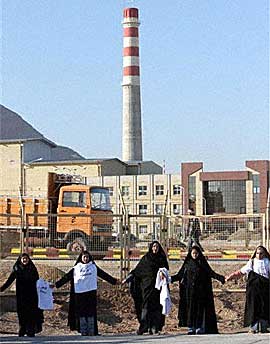UN security leaders bring Iran action a step nearer

China and Russia, long-time allies and trading partners of Iran, signed a statement that calls on the UN nuclear watchdog, the International Atomic Energy Agency, to transfer the Iran dossier to the Security Council, which could impose sanctions or take other harsh action.
Though the United States, Britain and France have been pressing to hand Iran's case to the Security Council, it had been unclear until now whether China and Russia would support such a move.
The foreign ministers from the five nations said, however, the Security Council should wait until March to take up the Iran case, after a formal report on Tehran's activities from the atomic agency.
The US Secretary of State Condoleezza Rice and her counterparts discussed Iran at a private dinner at the home of British Foreign Secretary Jack Straw. After the four-hour meeting, which spilled over into the early hours Tuesday, a joint statement called on the IAEA to report the Iran case at its meeting in Vienna on Thursday.
With support from Germany and the European Union, whose foreign ministers also attended the dinner, the overall agreement amounted to a compromise; take the case to the Security Council but allow a short breather before the council undertakes what could be a divisive debate.
Any of the five permanent members of the Security Council, all nuclear powers themselves, can veto an action supported by the full council membership.
The group agreed that the IAEA "should report to the Security Council its decision on the steps required of Iran, and should also report to the Security Council all IAEA reports and resolutions as adopted relating to this issue," a statement from the group said.
The IAEA has already found Iran in violation of nuclear obligations and issued a stern warning to Tehran in September. Thursday's vote would be the next step, one long sought by the United States.
Iran insists its nuclear program is intended only to produce electricity. The United States and some allies say Iran is hiding ambitions to build a nuclear bomb, but the Security Council members have been divided about how strong a line to take.
It is still not clear how Russia and China would vote if the questions of sanctions came before the Security Council. It is also not clear that the United States will win the broad international consensus it seeks when the IAEA votes.
The IAEA "will report on the situation in Iran and the way the Iranian authorities are not cooperating with the international agency," said a French government official, speaking on the customary condition of anonymity.
He said the Russian and Chinese ministers had initially been reluctant to agree to refer Iran to the Security Council, but were persuaded of the need for the council members to show a united front.
"It was very important to make sure they are all together on this issue and all agree on the same position."
"This is in the hands of the IAEA," UN spokesman Stephane Dujarric said of the agreement. "We're not going to say anything at this point."
Yesterday, Rice said the world agreed that Iran should not have the means of developing a nuclear weapon, and she criticized Iran's response to Russian attempts to mediate in the standoff.
"We believe that there is a lot of life left in the diplomacy," Rice said. "After all, going to the Security Council is not the end of diplomacy. It's just diplomacy in a different, more robust context."
Iran broke UN seals at a uranium enrichment plant Jan. 10 and said it would resume nuclear fuel research after a two-year freeze. Tehran said the research would involve what it called limited uranium enrichment, but the action raised fears Tehran was using its pursuit of atomic power as a front for a nuclear weapons program.
European foreign ministers met with Iran's deputy nuclear negotiator in Brussels on Monday but said they failed to make progress.
The EU said a Russian proposal to enrich uranium and send the fuel back to Iran, allowing more oversight of the process, could be the solution, but Rice has questioned the drawn out negotiations over the offer.
"This has now been several months. So when the Iranians now evince interest in the Russian proposal, one has to wonder if that isn't because they now face the prospect of referral to the Security Council," Rice said before the dinner meeting.
In Vienna, a diplomat familiar with the Iran probe said IAEA inspectors were allowed access to the Lavizan-Shian site — believed to be the repository of equipment bought by the Iranian military that could be used in a nuclear weapons program. The diplomat demanded anonymity in exchange for discussing confidential information about the status of the IAEA probe.
Iranian Foreign Ministry spokesman Hamid Reza Asefi said in Tehran on Sunday that IAEA inspectors trying to gain access to the site for more than a year had been given the information they sought.
The United States alleges Iran had conducted high-explosive tests that could have a bearing on developing nuclear weapons at the site.
The State Department said in 2004 that Lavizan's buildings had been dismantled and topsoil had been removed in attempts to hide nuclear weapons-related experiments.
Join our commenting forum
Join thought-provoking conversations, follow other Independent readers and see their replies
Comments